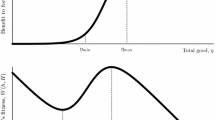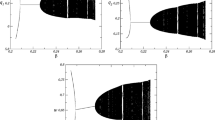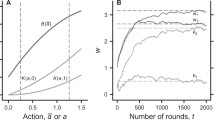Abstract
This paper explores the question whether boundedly rational agents learn to behave optimally when asked to voluntarily contribute to a public good. The dynamic game is described by an Evolutionary Algorithm, which is shown to extend the applicability of ordinary replicator dynamics of evolutionary game theory to problem sets characterized by finite populations and continuous strategy spaces. We analyze the learning process of purely and impurely altruistic agents and find in both cases the contribution level to converge towards the Nash equilibrium. The group size, the degree of initial heterogeneity and the propensity to experiment are key factors of the learning process.
Similar content being viewed by others
References
Andreoni, J. (1988a). Privately provided public goods in a Large Economy: The Limits of Altruism. Journal of Public Economics. 35, 57–73.
Andreoni, J. (1988b). Why Free Ride? Strategies and Learning in Public Goods Experiments. Journal of Public Economics, 37, 291–304.
Andreoni, J. (1990). Impure Altruism and Donations to Public Goods: A Theory of Warm-Glow Giving. Economic Journal, 100, 464–477.
Bäck, T. (1992a). The Interaction of Mutation Rate, Selection, and Self-Adaption with a Genetic Algorithm. in: R. Männer and B. Manderick (eds.), Parallel Problem Solving from Nature 2, Elsevier Science, Amsterdam.
Bäck, T. (1992b). Self-Adaption in Genetic Algorithms. in: Proceedings of the First European Conference on Artificial Life, MIT Press, Cambridge, MA.
Bäck, T. and Schütz, M. (1996). Intelligent Mutation Rate Control in Canonical Genetic Algorithms. in: W. Ras and M. Michalewicz (eds.), Foundations of Intelligent Systems 9th International Symposium, ISMIS 96, Springer-Verlag, Berlin, pp. 158–167.
Bergstrom, T., Blume, L. and Varian, H. (1986). On the Private Provision of Public Goods. Journal of Public Economics, 29, 25–49.
Binmore, K. and Samuelson, L. (1994). An Economist's Perspective on the Evolution of Norms. Journal of Institutional and Theoretical Economics, 150, 45–63.
Binmore, K., Gale, J. and Samuelson, L. (1995). Learning to Be Imperfect: The Ultimatum game. Games and Economic Behavior, 8, 56–90.
Birchenhall, C., Kastrinos, N. and Metcalfe, J.S. (1997). Genetic Algorithms in Evolutionary Modelling. Journal of Evolutionary Economics, 7 (4), 375–393.
Bliss, C. and Nalebuff, B. (1984). Dragon-Slaying and Ballroom Dancing: The Private Supply of a Public Good. Journal of Public Economics, 25, 1–12.
Camerer, C.F. (2003). Behavioral Game Theory. Experiments in Strategic Interaction, Princeton University Press, Princeton, NJ.
Clemens, C. and Haslinger, F. (2001). Komplexität und Lernen: Relevanz für die ökonomische Forschung und qualitative Aspekte, in: Peter Weise (ed.), Ökonomie und Gesellschaft: Jahrbuch 17: Komplexität und Lernen, Metropolis-Verlag, Marburg, pp. 11–48.
Cornes, R. and Sandler, T. (1996). The Theory of Externalities, Public Goods and Club Goods Cambridge University Press, Cambridge, 2nd edn.
Dixit, A. and Olson, M. (2000). Does Voluntary Participation Undermine the Coase Theorem?. Journal of Public Economics, 76, 309–335.
Fershtman, C. and Nitzan, S. (1991). Dynamic Voluntary Provision of Public Goods. European Economic Review, 35, 1057–1067.
Goldberg, D.E. (1989). Genetic Algorithms in Search, Optimization, and Machine Learning Addison-Wesley, Reading.
Gradstein, M. (1992). Time Dynamics and Incomplete Information in the Private Provision of Public Goods. Journal of Political Economy, 100 (5), 581–597.
Holland, J.H. (1975). Adaptation in Natural and Artificial Systems, University of Michigan Press, Ann Arbor.
Holland, J.H. (1992). Adaptation in Natural and Artificial Systems MIT Press, Cambridge, MA, 2nd edn.
Isaac, R.M., Walker, J.M. and Thomas, S.H. (1984). Divergent Evidence on Free Riding: an Experimental Examination of Possible Explanations. Public Choice, 43, 113–149.
Isaac, R.M., McCue, K.F., and Plott, C.R. (1985). Public Goods Provision in an Experimental Environment. Journal of Public Economics, 26, 51–74.
Kandori, M., Mailath, G.J. and Rob, R. (1993). Learning, Mutation, and Long Run Equilibria in Games. Econometrica, 61, 29–56.
Ledyard, J. (1995). Public Goods: A Survey of Experimental Research, in: John H. Kagel and Alvin E. Roth (eds.), The Handbook of Experimental Economics Princeton University Press, Princeton, pp. 111–194.
Marwell, G. and Ames, R.E. (1981). Economists Free Ride, Does Anyone Else?. Journal of Public Economics, 15, 295–310.
Metcalfe, J.S. (1994). Competition, Fisher's Principle and Increasing Returns in the Selection Process. Journal of Evolutionary Economics, 4, 327–346.
Miller, J.H. and Andreoni, J. (1991). Can Evolutionary Dynamics Explain Free Ridings in Experiments?. Economics Letters, 36, 9–15.
Olson, M. (1965). The Logic of Collective Action. Harvard University Press, Cambridge, MA.
Riechmann, T. (1999). Learning and Behavioral Stability – An Economic Interpretation of Genetic Algorithms. Journal of Evolutionary Economics, 9, 225–242.
Riechmann, T. (2001a). Genetic Algorithm Learning and Evolutionary Games. Journal of Economic Dynamics and Control, 25, 1019–1037.
Riechmann, T. (2001b). Learning in Economics. Analysis and Application of Genetic Algorithms. Physica–Verlag, Heidelberg.
Sugden, R. (1985). Consistent Conjectures and Voluntary Contributions to Public Goods: Why the Conventional Theory does not Work. Journal of Public Economics, 27, 117–124.
Varian, H.R. (1994). Sequential Contributions to Public Goods. Journal of Public Economics, 53, 165–186.
Vega-Redondo, F. (1996). Evolution, Games, and Economic Behavior. Oxford University Press, Oxford.
Weibull, J.W. (1995). Evolutionary Game Theory. MIT Press, Cambridge, MA.
Young, H.P. (1993). The Evolution of Conventions. Econometrica, 61, 57–84.
Author information
Authors and Affiliations
Corresponding author
Additional information
JEL Classifications: C6, C73, D83, H41
Rights and permissions
About this article
Cite this article
Clemens, C., Riechmann, T. Evolutionary Dynamics in Public Good Games. Comput Econ 28, 399–420 (2006). https://doi.org/10.1007/s10614-006-9044-4
Published:
Issue Date:
DOI: https://doi.org/10.1007/s10614-006-9044-4




